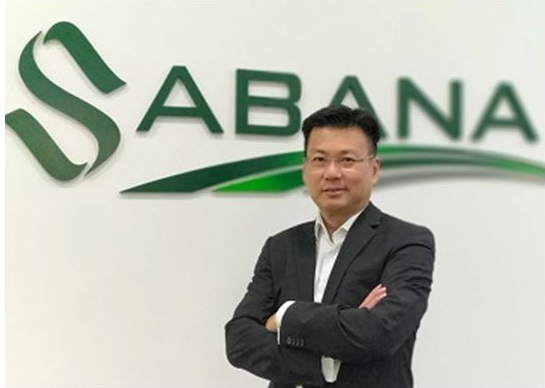 This article by Jennifer Tan (left, Director, Research & Products, Equities & Fixed Income, at the Singapore Exchange) was published in SGX's kopi-C: the Company brew series. The article is republished with permission.
This article by Jennifer Tan (left, Director, Research & Products, Equities & Fixed Income, at the Singapore Exchange) was published in SGX's kopi-C: the Company brew series. The article is republished with permission.
| Property veteran Donald Han is a tireless proponent of all things real estate. "If you slit my vein open, you will see nothing but real estate DNA there," quipped the Chief Executive Officer of the manager of SGX-listed Sabana REIT. "I'm not someone who understands or is interested in commodities, gold, or crypto-currencies, but I think, eat, drink and sleep real estate," he grinned. Han, who holds a Bachelor of Science in Estate Management from the National University of Singapore, has spent nearly three decades of his career in various real estate management, consulting and advisory roles, including Richard Ellis, Cushman & Wakefield, as well as Chesterton Singapore. His expertise ranges from residential agency, collective en-bloc and office investment sales to retail leasing, regional hospitality and hotel assets, as well as international project marketing.  Donald Han, CEO of Sabana REIT. Photo: Company Donald Han, CEO of Sabana REIT. Photo: Company |
The lure of the property sector comes from its relative stability, as values are typically supported by underlying assets. "Ultimately, it is a cashflow business, and that's what excites me."
Han assumed his current position as CEO of Sabana REIT in January 2018. "When the opportunity to join Sabana came up, I felt it was a challenge worth pursuing. No doubt this role is very different, but it allows me to apply the lessons learnt from my 30 years in the industry."
Listed on Singapore Exchange since November 2010, Sabana Shari'ah Compliant Industrial Real Estate Investment Trust (REIT) has a current market capitalisation of about S$430 million. The REIT's diversified property portfolio - valued at over S$900 million as at 31 December 2018 - currently comprises 18 assets in strategic locations across Singapore.
The REIT has four main industrial property segments - High-Tech Industrial, Chemical Warehouse and Logistics, Warehouse and Logistics, and General Industrial. Occupancy levels would have been 88.5% as at 31 December 2018, instead of 84.4%, if the divestment of two of its properties announced last September had been completed by end-2018.
Shari'ah-Compliant
The REIT is managed by Sabana Real Estate Investment Management Pte Ltd, which in turn is wholly owned by Sabana Investment Partners Pte Ltd. The latter currently counts SGX-listed Vibrant Group, Blackwood Investment, and Atrium Asia Capital Partners as its shareholders. Vibrant, a real estate, logistics and financial services provider, is the REIT's Sponsor. Warburg Pincus-backed e-Shang Redwood (ESR) also owns about 9.05% of Sabana REIT.
The REIT complies with Shari'ah investment principles and procedures, which are consistent with principles of Islamic law, and require general considerations of ethical investing, in terms of social responsibility in asset selection and structuring.
It also has to ensure that total rental income from lessees, tenants and/or sub-tenants engaging in activities prohibited under Shari'ah guidelines should not exceed 5.0% per annum of its gross revenue. Sabana's Shari'ah advisor, Five Pillars Pte Ltd, carries out annual audit checks to ensure that business activities conducted by tenants are permissible under Shari'ah guidelines.
Approximately 35% of the REIT's properties by gross floor area (GFA) are located on ground rental-free sites, while its portfolio has a long weighted unexpired lease term of close to 32.5 years for the underlying land.
After coming on board, Han's first priority was to regroup and restrategise. "We opted for simplicity and went back to basics. First, we focused on retaining existing tenants and bringing in new ones. Then we began selling properties that didn't quite fit within our portfolio," he said.
"The rule of thumb is to only acquire or retain assets in the central region where most prime properties are located, and steer clear of areas with a large supply pipeline."
In good times, prime assets are the first to increase in value, and in a downturn, they are the last to suffer price declines. The same goes for the rental market, he added.
At the end of the day, it's not only location, location, location, but also timing, timing, timing. "These are the yardsticks to facilitate the optimisation of total returns."
Bearing Fruit
Since March 2018, Sabana has sold two of three properties earmarked for disposal - 6 Woodlands Loop and 9 Tai Seng Drive - at combined prices more than double their book value. It continues to actively manage its portfolio, and remains focused on ramping up average occupancy levels nearer to 89.0%-90.0%.
"Already, the work from the past year is bearing fruit, as evident from a 3 cent-uplift in net asset value and reduced gearing ratio from divesting non-performing and mature properties," Han noted.
"Our actions have also given us sufficient debt headroom and flexibility to undertake growth initiatives."
The second phase of the REIT's strategy revolves around asset enhancement initiatives (AEIs). It has received provisional approval to rejuvenate its flagship property, New Tech Park at 151 Lorong Chuan, by introducing an additional 42,000 square feet in GFA for retail as well as food and beverage (F&B). Construction is targeted to start by the second half of this year, and the AEI is scheduled for completion in the second quarter of 2020.
This landmark asset represents about a third of the REIT's overall portfolio value, and boosting that will positively impact overall performance.
"Over the last six months, we have on-boarded new tenants at New Tech Park, and I'm pleased to note that almost all tenants who have leases expiring in 2019 are either negotiating to renew, or have renewed, their leases," Han said.
"The AEI is a game changer for New Tech Park's tenants and the residential neighbourhood, which is in line with the latest Draft 2019 Master Plan, where URA hopes to revitalise older buildings, rejuvenate neighbourhoods and provide decentralised employment to residents."
Phase 3 of the REIT's Refreshed Strategy, which focuses on 2020 and beyond, is targeted at moving Sabana up the industrial supply chain.
"We would like to buy yield-accretive assets in Singapore, but it's hard to find good deals. Our peers are also hungry for such deals - there are many big fish here in a relatively small pond, hence the necessity to invest abroad at some point," he said.
Portfolio Right-Sizing
Sabana also needs to optimise its portfolio further, to maintain the focus on centrally located properties in high-demand corridors that can attract the best-paying tenants.
"A lot of technology companies like Google are moving out of prime CBD office locations to capitalise on lower occupancy costs. To attract such tenants, we need to rejuvenate our buildings and upgrade amenities within," he said.
The REIT will zero-in on assets within a 10-15-minute drive radius from the Central Business District. "There are clients who want to relocate out of the CBD, and are willing to move 10-15 minutes, but not 30 minutes, away."
"Our properties like New Tech Park, 8 Commonwealth Avenue, 39 Ubi Road 1, 23 Serangoon North Avenue 5, 123 Genting Lane and 10 Changi South Street 2 fit that bill, and we will be repositioning our portfolio to target that market," he added.
CBD office rentals have risen by 10% year-over-year for the past three years, and are expected to continue climbing. "We thrive when CBD office rents go up. Companies with back-room operations, which don't need to be in the CBD, will seek high-tech, business park options offering rates at just a third of those for CBD offices."
The next area of focus is to identify "low-hanging fruits" and optimise assets in the REIT's portfolio that have under-utilised plot ratios.
"New Tech Park has a potentially under-utilised plot ratio of 0.55 times, which translates to an additional 240,000 square feet of prime GFA. If approved, we hope to offer 'build-to-suit' campus sites for multinational companies," he said.
"Since we already own the land, and development expenses mainly comprise development levy and construction costs, why not?"
Venturing Overseas
Apart from the domestic market, Sabana may also consider acquiring suitable assets abroad.
"We like Europe quite a fair bit because it offers little or no oversupply, less government intervention, and the market is stable, with very little volatility. WALEs tend to be longer - averaging five to six years versus two to three years here," he said, referring to weighted average lease expiry, a key industry metric.
|
“We're always looking for first-tier, transparent markets that have bottomed out - it's all about timing and being on the right side of the recovery cycle. At this point, we like Europe more than Australia. However, by the time we're ready, things could change, and Australia may start to look attractive again.” |
Foreign industrial assets also tend to be freehold in nature, compared to under-30 year leases by JTC, Singapore's largest industrial landlord.
"Freehold assets also allow you to landbank - not only does the asset continue to generate rental income for a sustainable DPU, there's a chance to reconvert or rezone such sites to other uses in future," he added, referring to distribution per unit, which is closely monitored by unit holders.
However, Sabana plans to take its time to venture abroad. "Our hands are busy getting Phase 2 up and running. It's still early days for us," Han said.
Sailing Rough Waters
Meanwhile, the challenges facing Sabana REIT are more external than internal. "Singapore's 1Q GDP growth was the slowest since 2009, and non-oil domestic exports shrank the most since 2016, due to weak electronics and manufacturing activity," Han noted.
As a result, the outlook for domestic industrial property remains mixed. "The market peaked in 2013 to 2014, and bottomed in 2018. We're looking at lower supply for the industrial sector over the next three years versus the last three years, so the market may be ripe for a rebound."
But performances of different industrial segments tend to vary, as the market is not homogeneous. "Some sectors are bottoming, while others still have a long way to go. To stay competitive, we need to use a gamut of strategies to target a variety of tenant clusters and sub-segments," he added.
Overall rent reversion for the rest of this year is likely to stay negative, with continued oversupply and island-wide vacancy rates of about 11%, according to a JTC report published in January.
For unit holders, Han advises patience. "With 18 properties and a total GFA of 4.1 million square feet, we're more of an oil tanker than a ship. It will take a while to change course - be patient with us, and judge me on my Phase 2 results, particularly in transforming New Tech Park."
So far, the improvements in metrics have been marked - the REIT's net asset value has risen to 57 Singapore cents per unit, versus 54 cents in early 2018. At the end of the January-March quarter, it had gearing of 33.9%. After redeeming trust certificates in early April using internal proceeds, gearing has now fallen well below 33%.
"This compares favourably with a gearing level of 38% in 1Q 2018 when I came on board, and the industry average of about 35%," he added.
Sabana's progress dovetails with the 55-year-old's mantra of playing to win.
The self-confessed tennis freak makes it a point to teach his children - a girl, 21, and two boys aged 23 and 25 - the key values of perseverance and responsibility. "Never lose your hunger, and never give up," he said.
"If you want to do something, do it right. Don't play to lose, keep your game sharp, and keep track of the score. It's the same as running a REIT - embark on a journey that leads you to your goals."

